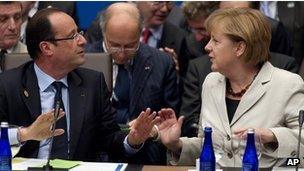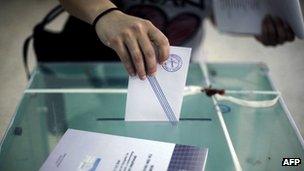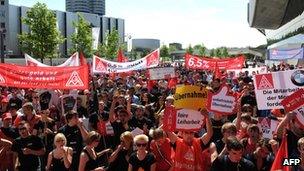Dinner in Brussels - jobs, growth and break-up on the menu
- Published
- comments

The relationship between Francois Hollande and Angela Merkel is getting a lot of attention
It might only be an informal dinner but this is the 18th time in the past two years that Europe's leaders have gathered in Brussels.
The menu might have changed but the agenda has not: to fix a crisis threatening the future of the euro and the world economy.
Never has the pressure been greater. The once taboo subject of the eurozone breaking up is openly discussed.
Already plans are being drawn up as to how such a break-up could be "managed".
Britain's Chancellor of the Exchequer, George Osborne, said the eurozone was at a "critical point".
The Organisation for Economic Co-operation and Development, external (OECD) warns of a "severe recession" in the zone.
President Obama has been twisting arms - much to the irritation of some of Europe's leaders.
Jobs and growth
What the markets want to know is who and what stands behind this currency in the final resort. There is currently no answer to this.
The dinner only underscores the difficulty of taking decisive action.
The agenda is jobs and growth.
Until recently the emphasis in Europe was on austerity, on driving down deficits.
Many say that policy has failed; that it has driven weaker countries into a cycle of decline.
It is now forecast that Greece faces a sixth year of recession.
Both Italy and Spain - currently in recession - are expected to see their economies shrink next year too.
It is the arrival of Francois Hollande as French President that has forced growth up the agenda.
It was being debated before. David Cameron energetically pushed ideas for growth at a summit in March.
But Francois Hollande directly challenged the German narrative during his election campaign.
His priority is growth and the early signs are that he will not back away from that - particularly with parliamentary elections due in June.

Greece's future will be decided when the country holds a new election on 17 June
Long term view
He said he wants no taboos when it comes to tonight's meeting. So he will raise the idea of eurobonds - a sharing of the debt burden.
If all countries stand behind eurozone debt then the borrowing costs for most countries will fall although they will edge higher for Germany.
At least for now Germany remains implacably opposed to the idea.
It sees it as removing the incentive for countries to get their finances in order.
Yesterday German officials were briefing that they will not bend on this.
The Austrian finance minister described the French plan as "nonsense".
Other measures may be easier to agree on: deploying unused EU structural funds to support growth, boosting the capital of the European Investment Bank, external to help small businesses, backing a trial project to invest in infrastructure, expanding the single market.
The problem is that the impact of these ideas lies in the long term.
The German view is that growth will best come through tough reforms, freeing up the labour markets.
The French disagree. They favour spending on infrastructure projects and quickly.
The Germans have a red line; they will oppose increasing debt to stimulate the economy.
A German minister told me in Berlin last week "if we go down that road we have learnt nothing".
Compromise
Much attention will focus on the relationship between the German chancellor and the new French president.
It was a rather edgy first encounter last week. Both of them know that come the major summit in June they have to be on the same side.

Germany's IG Metall union organised protests earlier this month calling for pay rises
Angela Merkel is not isolated. The Austrians, the Dutch, the Finns and others are with her. But she no longer commands the stage.
In his corner Francois Hollande has the Italians, the Spanish and David Cameron. (What the British want is a much larger rescue fund - the so-called firewall, a massive recapitalising of the banks, and for Germany to stand behind the currency).
The Germans are not inflexible. Recently they have agreed to larger wage settlements.
Their largest union, IG Metall, has just agreed to a 4.3% pay rise for nearly three million workers.
That should increase demand for goods from outside Germany.
The German finance minister has accepted that the country can cope with some more inflation.
The Germans will support new growth measures but they want countries to stick to the targets for reducing their deficits.
That includes France. One of their fears is that France requests an extra year to bring its deficit down to 3%.
If that happens other countries will surely follow.
And then there is Greece.
The official line is that Athens must accept the terms of the bailout deal - including the austerity measures - or "face the consequences".
Everyone will be looking to see whether there are hints that the bailout terms could be softened in the future but the expectation is that the message to Greece will not change.
It is a dinner tonight where no firm decisions will be taken.
It is a curtain raiser for a much more important two day summit in June.
By then Greece will have made its choice and the Spanish banks will have demonstrated whether they need outside help.
Europe could already be a different place.